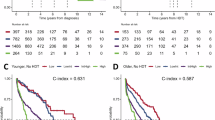Play all audios:

ABSTRACT Analyses of prognostic factors have allowed the design of staging systems in different haematological disorders. In a series of 220 patients with multiple myeloma, univariate
analysis showed that nine parameters had a significant adverse effect on survival; poor performance status (Karnowsky scaling system less than 70%), infections before diagnosis, renal
impairment (assessed either by creatinine clearance greater than 2 mg dl-1 or urea greater than 40 mg dl-1), serum calcium (greater than 10 mg dl-1), severe anaemia (less than 8.5 g dl-1),
the presence of Bence-Jones proteinuria, failure to achieve complete remission, more than 40% plasma cells in bone marrow and a low paraprotein index (monoclonal component/% plasma cells: P
less than 0.09). In addition, this index correlated significantly with all the other prognostic factors except performance status. The best combination of disease characteristics selected by
means of the Cox regression proportional hazards method were performance status and creatinine levels. Additionally, by factor analysis of principal components we obtained a regression
equation that included creatinine levels, haemoglobin, performance status and paraprotein index. Using this it was possible to separate the series of patients into three risk categories: A
(65 patients), B (69 patients) and C (65 patients) with a median survival of 41, 24 and 12 months, respectively. The model provided similar results to those of the British Medical Research
Council, whereas the staging systems proposed by Durie and Salmon, Merlin et al. and Carbone et al. had a lower discriminant value in our series. Access through your institution Buy or
subscribe This is a preview of subscription content, access via your institution ACCESS OPTIONS Access through your institution Subscribe to this journal Receive 24 print issues and online
access $259.00 per year only $10.79 per issue Learn more Buy this article * Purchase on SpringerLink * Instant access to full article PDF Buy now Prices may be subject to local taxes which
are calculated during checkout ADDITIONAL ACCESS OPTIONS: * Log in * Learn about institutional subscriptions * Read our FAQs * Contact customer support SIMILAR CONTENT BEING VIEWED BY OTHERS
A REAL-WORLD INTERNATIONAL STAGING SYSTEM (RW-ISS) FOR PATIENTS WITH NEWLY DIAGNOSED MULTIPLE MYELOMA Article Open access 07 April 2025 CHANGES IN RDW ACCORDING TO PROGNOSTIC PREDICTORS IN
NEWLY DIAGNOSED MULTIPLE MYELOMA Article Open access 03 February 2024 A SIMPLE ADDITIVE STAGING SYSTEM FOR NEWLY DIAGNOSED MULTIPLE MYELOMA Article Open access 31 January 2022 AUTHOR
INFORMATION AUTHORS AND AFFILIATIONS * Department of Haematology, Hospital Clinico Universitario, Salamanca, Spain JF San Miguel Authors * JF San Miguel View author publications You can also
search for this author inPubMed Google Scholar * J Sànchez View author publications You can also search for this author inPubMed Google Scholar * M Gonzalez View author publications You can
also search for this author inPubMed Google Scholar RIGHTS AND PERMISSIONS Reprints and permissions ABOUT THIS ARTICLE CITE THIS ARTICLE San Miguel, J., Sànchez, J. & Gonzalez, M.
Prognostic factors and classification in multiple myeloma. _Br J Cancer_ 59, 113–118 (1989). https://doi.org/10.1038/bjc.1989.23 Download citation * Issue Date: 01 January 1989 * DOI:
https://doi.org/10.1038/bjc.1989.23 SHARE THIS ARTICLE Anyone you share the following link with will be able to read this content: Get shareable link Sorry, a shareable link is not currently
available for this article. Copy to clipboard Provided by the Springer Nature SharedIt content-sharing initiative
